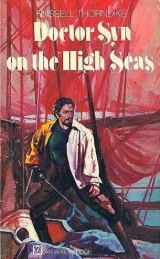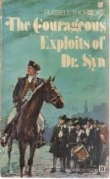
Текст книги "Doctor Syn on the High Seas"
Автор книги: Russell Thorndike
Жанр:
Исторические приключения
сообщить о нарушении
Текущая страница: 1 (всего у книги 14 страниц)
Doctor Syn on the High Seas
by
Russell Thorndike
1936
keyed by Connie Lewis
To the memory of
John Buchan
under whose auscpices Doctor Syn
was first published, I respectfully
dedicate this volume, which
completes the Doctor’s history
Contents
Prologue: The Syns o’Lydd ……………………….. 4
1 Doctor Syn Meets Mister Mips ……………………… 6
2 Doctor Syn Becomes a Squire of Dames ………………. 10
3 Doctor Syn Escapes ………………………………. 17
4 The Challenge …………………………………… 22
5 The Abduction …………………………………… 29
6 The Duel ……………………………………….. 33
7 The Friend of the Family …………………………. 51
8 The Elopement …………………………………… 54
9 The Dead Man ……………………………………. 61
10 The Odyssey Begins ………………………………. 62
11 Pirates ………………………………………… 71
12 Syn Buys a Body and Soul …………………………. 75
13 Redskins ……………………………………….. 83
14 Clegg’s Harpoon …………………………………. 93
15 Syn Hoists the Black Flag ………………………… 102
16 The Red-Bearded Planter ………………………….. 104
17 Clegg’s “Imogene” ……………………………….. 106
18 Mutiny …………………………………………. 107
19 The Mulatto …………………………………….. 109
20 The Return ……………………………………….
– 3 -
Prologue
The Syns o’Lydd
Syn is a name synonymous with “law and order” upon Romney Marsh. The
Syns o’Lydd have been legal prolocutors and attorneys-at-law for
Marshmen since the old days when Thomas Wolsey raised the lofty
campanile of the parish church to heighten the glory of God in the
neighbourhood, and incidentally to typify his own ambition. No doubt a
Syn of those days was as useful to the Ipswich grazier’s son as other
Syns have been to native graziers upon the Marsh. Whenever they fell
into legal difficulties there was always a Syn to pull them out.
So: an ancient town, Lydd; and an ancient race, the Syns.
Prolific, too, as their massed ranks of tombstones in the churchyard
show; while their mural tablets in the church itself serve as a
testimony for all time to the family’s integrity and learnin g.
Go where you will in the neighbourhood, and rummage amongst old
chests and cupboards until you have collected a pile of legal documents,
ancient and modern, as high as Wolsey’s Tower, and you will indeed be
hard put to discover one parchment that does not show the signature of a
Syn attorney. Statutes, recognizances, fines, conveyance of land or
messuage, recoveries, easements, vouchers, testaments and bequests—the
signature of Syn appears upon them all.
Of comfortable means they always seem possessed. They inhabited the
most mellow houses in Lydd and the adjacent New Romney. While waiting
for clients, they purchased for themselves, until by judicious
bargaining they gradually acquired much fertile land, large flocks of
good wool, and such substantial homesteads that no other family could
boast of a more delectable name upon the Marsh.
When there were no more purchasable properties upon the Levels of the
Marsh, they lifted their eyes into the hills, carrying their territorial
conquests along the skyline from Aldington to Lympne. But when they
realized that no financial embarrassment could shift the ancient
Pemburys from their fastness of Lympne Castle, they pushed their own
family possessions inland, acquiring property in Bonnington, Bilsington
and Appledore, until there was even a Syn attorney secure in distant
Tenterden, possessing the best cellars and stables in that comfortable
sleepy town.
Now, the holding of land upon the hills gave to the Syns, as it did
to other Marshmen in like case, a sense of security, for
the reclaimed pasturage of Romney Marsh owed its existence to the
Dymchurch Wall, which held the sea in check. The slogan of
the Marsh, “Serve God, honour the King; but first maintain the Wall”,
showed that possible calamity wa s ever in their minds, and Marshmen like
to think they had a retreat in the uplands in the event of the sea
breaking through and overwhelming the lower Levels. As folk in face of
a common danger are apt to hang together, so did the Marshmen show a
loyalty to one another. But none were so clannish as the Syns. They
inter-married. Syn kith led Syn kin to the altar, and in due course
added further cousins to the Syns. But just as in the most fruitful
tree will sometimes have its barren period in all its
– 4 -
branches, so did the Syn dynasty have its sterile age, and this in the
mid years of the eighteenth century, the time in which this history is
about to be
unfolded. Then were the Syns sadly depleted. Jacobite tendencies
caused the family to send their best blood to be spilled in the Young
Pretender’s cause. Then an epidemic of ague which swept the Marsh took
heavy toll, so that the Syns, who had in the past multiplied so
exceedingly and covered the lands of the Levels of Romney, Welland, and
Denge; the Syns who had covered as many dead sheepskins with ink as they
had covered living sheepskins with wool, found themselves ten years
after the “45” bereft of their good men and true, and represented only
by old Solomon Syn, attorney at Romney, and his nephew Christopher Syn,
the youngest Don at Queen’s College, Oxford, and the youngest Doctor of
Divinity in either of the Great Universities.
His father, Septimus Syn, had been clerk to the Lords of the Level of
Romney Marsh, under the magistracy of Sir Charles Cobtree, who resided
at the Court House of Dymchurch-under-the-Wall. A tall, thin and
austere man, this Septimus, who to all outward appearances was as dry as
the parchments over which he toiled. But beneath his legal dustiness
there must have been burned a bright spark of adventurous romance, for
at the outbreak of the “45” he cast aside his quills and sandbox,
buckled on his sword, and took ship to Scotland, where he joined the
Young Pretender’s force. He wisely left his wife and only child under
the joint guardianship of his elder brother Solomon and Sir Charles
Cobtree. Wisely, for with three of his brothers he was killed at
Culloden. His wife followed him to the grave the same year—of a broken
heart, it was said—and thus at the age of eighteen was Christopher Syn
an orphan. Besides his two excellent guardians, his parents had
bequeathed to him many other valuable assets: a sufficient sum of money
to insure his independence and a brain and personality capable of
improving with security.
In the year 1754, when this history begins, Christopher Syn was in his
twenty-fifth year, and, as resident classical tutor at Queen’s College,
was respected by his elders and popular with
his students. As his great friend Antony Cobtree told his father, Sir
Charles, at Dymchurch, “I owe my degree to Christopher’s patience and
perseverence. By applying the spur at the right moment he lifted me
over the hedges that barred my way to scholarship.”
Although beloved by all, the young Doctor, two years juni or to Tony
Cobtree, was a sombre, tragic figure. Eyes deep, piercing and alive.
Hair raven black. Tall, slim and weird, with a brooding melancholy that
faded only when he smiled, and that because his smile conveyed a
princely graciousness, and a pledge of loyal friendship to the fortunate
recipient. Yes, a man of classic beauty and strength well equipped to
face and overcome whatever fate might hold in store for him. As an
orator he was magnificent, for each spoken syllable claimed its utmost
value, and every phrase its place of full significance, and backed in
all its moods by expressive movements of his wonderful hands, whose
strong delicacy could express more than most men’s tongues. A
personality that could not fail to make its mark in any walk of li fe,
but was at present confined within the bounds of scholarship at Oxford
University, a Doctor of Divinity. A priest. But more than all a man of
high
romance.
– 5 -
Chapter 1
Doctor Syn Meets Mister Mipps
On a misty morning of late Se ptember in the year 1754, young
Christopher Syn, D.D., was riding along the flat top of the Dymchurch
SeaWall in the direction of Lympne.
The Oxford Summer Vacation was drawing to its close, and he had spent
it happily, partly with his uncle, the red-faced, rotund and jovial
attorney at New Romney, and partly with his boon companion Tony Cobtree
at Sir Charles’ old Court-house at Dymchurch.
The young student left the seawall and cantered his horse along the
winding roads that crossed the Marsh. Eventually he reached the grassy
bridle-path which runs along the foot of the hills, and has been made in
years gone by for easy access from camp to camp by the Roman Legions.
On either side the path sloped steeply down into deep, broad dykes, fed
by the surface-water from the hills, but Syn’s tall grey horse picked
his way carefully. Meanwhile the sun, gathering strength, had dispersed
the mist from the hills, and above him he could see his objective—the
grim, frowning walls of Lympne Castle. He was on his way there to
oblige Sir Henry Pembury, who had sent a Castle servant the night before
to the Dymchurch Court-House, bearing a note requesting Doctor Syn to
wait upon the Lord of Lympne at his earliest convenience. Being an old
friend of his Uncle Solomon and a Justice of the Peace, the young cleric
had taken the first opportunity to comply, though neither himself nor
the Cobtrees could think why Sir Henry should thus summon him. Little
did he imagine that such a simple journey was to be the prelude of a
mighty Odyssey which would demand the abandonment of books and
scholarship for murderous adventures with gunpowder and steel.
Opposite the Castle Hill, the bridle-path sloped gently down till
level with the dyke-water, and it was here that a resolute horseman
could save himself a good mile’s detour by leaping the dyke. Knowing
what was required of him, the horse, at the first touch of his master’s
heel, thundered down the slope, and with a sideways jump cleared the
water with a good two foot to spare. Reining him in on the farther
side, Doctor Syn patted the horse’s neck and dismounted, and with the
bridle over his arm led the way up the steep meadow that swept down from
the Castle walls. Throughout the ascent, the man and horse threaded
their way between giant blocks of crumbling masonry—all that was left
of the great Roman Portus Lemanis. In some of these walls could yet be
seen the metal rings for mooring galleys, but the grim
bulwarks which had once held back the sea were now embedded in grass and
used as shelter by the grazing sheep.
Now, bright noon-time, with sun-rays sparkling upon dewy grass-blades
and a fine expanse of sea about one, is no time for a man to reuminate
on ghosts, of things long dead, and yet Doctor Syn fell to wondering
whether any Roman spectre yet mounted his guard in spirit form upon
these walls.
Hardly had this flight of fancy flown to his brain when a sharp voice
belonging to some invisible shape cried out the challenge, “Who goes
there? I knows you. Halt and put yo ur hands above your head.”
Doctor Syn halted, not so much from fear as from astonishment. He
looked hard at the ruined bastion he was approaching, and from which the
voice had issued, but could see nothing unusual.
“Now, then,” went on the voice. “Hands up, I said and I don’t see ‘em
up. No humbug now. I knows you and you knows me.”
“Whom do you take me for?” asked Doctor Syn politely.
– 6 -
“For what you are, of course,” came the indignant answer: “the new
Riding Officer at Sandgate—grey horse and all, and dressed like an
undertaker. Well, you won’t undertake me, because I ain’t a -going to be
undertook.”
It was then that Doctor Syn noticed the brass bell of a blunderbuss
wobbling at him through a fissure in the wall.
“Whom do you take me for?” says you, all innocent like,” went on the
voice sarcastically. ‘“The ruddy Customs,’ says I, ‘who goes spying
round traverns and listening to the talk of poor drunkards in order to
get on my track.”‘ And what for? Why, for having given a hand with a
tub or two to help the Dymchurch lads to a drink or two. We’ve had
about enough of you ruddy Riding Officers, and I for one aint’ standing
much more.”
“And I for another am not standing insult from any man, blunderbuss
or not,” replied Syn sharply. “You call me a Custom man, do you? Well,
as a Marshman born and bred, I take that as an insult—a ruddy insult,
as you seem to like that adjective. You, no doubt, are the Mister Mipps
who works in Wraight’s boatbuilding yard at Dymchurch-under-the-Wall. I
know all about you from my friend Tony Cobtree, the Squire’s son.
You’re a carpenter by trade and a smuggler by profit. I am no smuggler
myself, perhaps for lack of opportunity, by my people, the Syns o’ Lyd,
have saved many a one from the gallows.”
A whistle of astonishment came from the other side of the wall, and
the blunderbluss was withdrawn. “Ah, well, then, there’s no quarrel,
and I’ve been most damnably mistook in you, for which I asks your
honour’s pardon. A Syn o’ Lydd, are you? Then you’ll be old Mister
Solomon’s nephew, no doubt.”
“Quite right. They call me Doctor Syn.”
“What? A sawbones?”
“No, a parson. Come out of that fortification and shake hands.”
“Not me, even though you ain’t the ruddy Customs,” replied the voice.
“No showing myself on no skylines in case ruddy Customs does appear.
Step in, and I’ll give you as good a drink as ever you tasted. But I
ain’t coming out.”
“I approve your caution, Mister Mipps,” laughed the parson. “I’ll
come in, and if the drink you mention has not paid Customs it will of
necessity taste the sweeter.”
So Doctor Syn, after tying his bridle to a ring in the wall, walked
into the ruined bastion.
Mister Mipps gave the young parson the impression that had he not
been bor n a man, he would have been bred a ferret, for the most striking
feature in the little fellow was his nose—long, thin, and inquisitivelooking. As though to balance it, his hair, though scanty, was dragged
back and twisted into a tarred queue which stuck out at the back. In
addition, Mipps proved to be very thin, very small, dressed like a
sailor, and carrying an atmosphere of important impertinence. And,
again like a ferret, he was quick in movement and comically commanding.
“Glad to make your acquai ntance, Mister Mipps,” said the parson,
holding out his hand.
Mipps wiped his on the skirt of his coat and welcomed his guest with
a hard grip. He then removed the bung from a hand anker of brandy, a
neat little cask bound with brass hoops. Doctor Syn drank with relish,
and returned the anker. Mipps in his turn drank deep.
“Good brandy never hurt nobody,” he grinned.
“No, not even a parson,” replied the Doctor with a smile.
“And I drinks to the Syns o’Lydd,” said Mipps, handing the anker back
again.
– 7 -
“And I drink to you,” returned the Doctor, “and to all Marshmen, and
may the Customs never get a one of them to hang upon the grisly tree of
old Jack Ketch.” Then, looking round the interior of the bastion, he
added: “No wonder you preferred to shoot a Riding Officer rather than
being carried away from here. It is all very cozy. I envy you this
gypsy life. It is adventurous; it is simple and natural.”
“Aye, sir,” said Mipps, looking pleased. “A good clod fire always
burning for food and warmth, and that there hurdle with broom on top for
shelter; what more can a man want?”
“Only brandy, it seems, and that you have,” laughed Syn. “How long
have you been in hiding here?”
“Couple of weeks,” replied Mipps. “Though I’m thinki ng of moving
myself on, and legging it down coast for Portsmouth.”
“What do you want to go there for?” asked the parson.
“To ship for the West Indies,” replied the little man. “Thinking of
working my passage on a man o’war as ship’s carpenter. Then I’ll
desert, ‘cos they won’t want for to lose me, being good at my work, and
then I’ll get down amongst the Brethren of the Coast.”
“You mean go pirating?” asked Syn. “For that’s all they are these
days, I understand. The jolly buccaneers have given place to a scum of
bloodyminded pirates. I suppose as a parson I should rebuke you for
such a wish.”
“Never rebuke a man for wishing to live a man’s life and playing the
man when he’s in it,” returned the other. “There’s good and bad in
every trade, and I expects piracy included. And I’ll play the man with
the dirtiest of ‘em. Small I may be, but I’ve grit sharp as flint. A
life of adventure for me. And from all accounts you gets it there.
Battle, murder—”
“Aye, and sudden death,” completed th e Doctor.
“Aye, aye, sir,” grinned Mipps; “but always allowing that you don’t
shoot first and straight.”
“There’s Execution Dock too,” argued the parson. “Have you thought
of that?”
“It’s better to die in old England at the last,” said Mipps.
“Besides, some of us has been born with a rare talent for escape, and
I’d never believe no one could hang me till I felt myself cut down.”
“A true adventurer, I see,” replied Doctor Syn; “and once more I envy
you. Whether you are boasting of your talents or not, I cannot say as
yet, though it seems that they are to be put to an immediate test.
While we have been talking, I have had my eye on Lympne Castle, and it
may interest you to know that three horsemen are riding down along the
western wall. It is significant to me that they are heading in our
direction, and that their leader is riding a dappled grey, very similar
to mine.”
“Sandgate swine,” hissed Mipps, grasping his blunderbuss. “Well,
I’ll at least prove my boast about shooting first and straight.”
‘You’ll attempt no such folly,” retorted Syn sharply. “Unless of
course you wish to forgo all possibility of becoming a good and bloodyminded pirate. You leave the officers to me, and you may yet see your
battle and murder on the Spanish Main. Hold these, and keep yourself
most religiously out of sight.”
Doctor syn had quickly unbuttoned his long black riding-coat, and
from one of his breeches pockets had taken out a handful of coins. Then
he counted into the little man’s hand, saying: “Three guinea spades,
two crowns and a new fourpenny. Keep them safely and yourself hidden,
or you’ll hang.”
– 8 -
Waiting a few moments till the approaching riders were behind a clump
of trees, he slipped out of the bastion walls and untethered his horse.
By the time the officers had emerged from the trees he was slowly
climbing the hill towards them, and since there were many other ruins
scattered about the hillside, there was nothing to connect with the
bastion occupied by Mipps. Meanwhil e, the fugitive, with his weapon at
the ready, cautiously peeped through a hole in the wall, straining his
ears
to listen to whatever the parson might say. This was easy enough, since
the voice of the officer turned out to be coarse, loud and overbearing,
while that of the parson extremely clear -spoken.
The officer was the first to speak. “Have you seen anything, you,
sir, of a dirty-looking little rat of a man in this immediate
neighbourhood?”
“I was about to put the very same question to you, sir,” replied
Doctor Syn; “for he must have passed within a few yards of you as he
went up the hill but now. I hope for your own sakes that you are not
anxious as I am to lay him by the heels.”
“Considering he’s an approved smuggler and we are Riding Offi cers for
Customers,” replied the officer, “I should say that no one could be more
anxious than we are to shackle him. What’s your quarrel with the
rascal?”
‘Just this,” replied Syn, making a wry face as he turned out the
empty lining of his breeches pocket. “He came upon me unawares, and
relieved this very pocket of three guinea-pieces, two crowns, and a
sliver fourpenny.”
“And you offered no resistance?” asked the officer scornfully. “An
agile man like you, tall, young and commanding, should have been a match
for that little rat. Or did you resist him and let him get the better
of you?”
Doctor Syn shook his head. “I did not resist for two reasons.
First, I am a parson and man of peace. And, Secondly, I preferred to
give him my gold rather than let him give me his lead.”
“Aye, and the revered young gentleman’s quite right,” said one of the
other officers. “That there Mipps would pull a blunderbuss at a man as
soon as I would at a rabbit.”
“Which way did he go? Up the hill, you said? An d it’s just time for
the carrier’s cart to start for Ashford. He’ll no doubt use some of
your money to save his legs. Come on, my lads, we’ll ride him down
yet,” And the officer turned his horse.
“I’ll be vastly obliged if you catch him,” called out the parson. “I
am but now on my way to lodge complaint with Sir Henry Pembury, who is a
Justice of the Peace. I am Doctor Syn, residing at the Court-House of
Dymchurch, and I shall be grateful if you can return at least some of
the money to that house. Sir Charles Cobtree is also a magistrate, as
you may know.”
“We’ll catch the bit of gallows meat before he gets much farther,
don’t you worry,” and, followed by his assistants, the officer set his
spurs to his horse and galloped up the hill.
When it w as safe for Doctor Syn to return to the bastion, he found
his comical little companion chuckling. “Well, you certainly settled
them very neat, sir. But I must first give you the lie and retun the
money. Here it is.”
“No indeed,” smiled the parson. “So long as you have it I have told
no lie except that you went up the hill. Instead, I strongly advise you
to go down it. Get on to the friendly Marsh, and use the money to help
you the quicker towards Portsmouth. Were it not for my cloth and duty,
I should be tempted to accompany you. Together we could rule it royally
amongst the pirates. Who knows but that we might not terrorize the
Spanish Main?”
– 9 -
“Well, sir,” replied Mipps with a wink, “if ever you should tire of
your pulpit, go avoyaging and fall into my hands, I pledge you my
solemn word that I will not make you walk the plank. You shall walk the
poop-deck with a sword at your side and a sash stuffed with pistols.
Success to us both. Long life for the King, and Down with the
Government and Customs.”
Doctor Syn laughed, and humorously drank the proffered toast, adding
that should he ever tire of his own profession in England, he would
leave his beloved brethren to another’s cure and seek out the wilder
Brethren of the Coast, where no doubt he and Mister Mipps might
forgather on the poop of some black pirate ship.
Great would have been the astonishment of these ill-assorted
companions had they realized that very soon their joking was to turn
into grim reality. Ignorant of this, however, they parted after mutual
commendations of Good Luck, Mipps shouldering his few bundled
possessions and taking the lower road for Portsmouth by way of Dymchurch
and Rye, and Doctor Syn leading his horse up the steep incline to Lympne
Castle.
At the top of the hill, under shadow of the old bulwarks, he turned
and looked back upon the flat Marshland, intersected with the slivery
ribboned water of the dykes, and spread out beneath him like a vast map.
He was amused to see that his little companion had already reached the
dyke, and from somewhere in the grass Mipps had discovered a long plank,
which he had successfully pushed across the water, and over this
perilous bridge the little man was now walking. And then there came,
owing to his former conversation with Mister Mipps, the first line of a
chanty that was destined to become the terror of the pirate crews. “Oh,
here’s to the feet that have walked the plank.” Aye, Aye, sir, a grim
slogan that was to strike fear into the very fo’c’sles of the worst
ships flying the Jolly Roger. Mister Mipps wobbled over to the other
side of the dyke and then turned round and waved. Doctor Syn waved
back.








